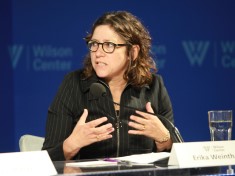-
Erika Weinthal on the Weaponization of Water in Conflict Settings
August 2, 2019 By Benjamin Bosland “When you’re in a post-conflict phase, it means we really should be moving away from humanitarian assistance into development because we’ve moved along the conflict spectrum toward peace and development,” says Erika Weinthal, the Lee Hill Snowdon Professor of Environmental Policy at Duke University, in this week’s Water Stories podcast.
“When you’re in a post-conflict phase, it means we really should be moving away from humanitarian assistance into development because we’ve moved along the conflict spectrum toward peace and development,” says Erika Weinthal, the Lee Hill Snowdon Professor of Environmental Policy at Duke University, in this week’s Water Stories podcast.“When you’re in a post-conflict phase, it means we really should be moving away from humanitarian assistance into development because we’ve moved along the conflict spectrum toward peace and development,” says Erika Weinthal, the Lee Hill Snowdon Professor of Environmental Policy at Duke University, in this week’s Water Stories podcast.
A problem arises, Weinthal says, when you don’t recognize that conflict is still going on.
Humanitarian vs. Development Responses
In many conflict settings, the humanitarian and development community both try to provide aid to those in need. However, they often work at odds with one another, she said. The humanitarian sector focuses on addressing immediate needs by providing basic services and access to potable water. Meanwhile the development sector aims to build lasting infrastructure and foster sustainable, long-term, prosperity.
Aid communities should be careful about the terminology they use when referring to various stages of conflict, says Weinthal. Using the term “post-conflict” comes with implications because it mandates a particular type of intervention. “The global community has often said Afghanistan is post-conflict, Iraq is post-conflict, but the empirical reality on the ground is that there is a lot of conflict still going on,” she says. Where a protracted humanitarian crisis still festers, development actors on the ground must recognize that what may be the most beneficial in terms of restoring livelihoods is providing basic resources and access to water.
Nontraditional War
Weinthal has also tracked attacks on infrastructure in Iraq, Yemen, Syria, and Libya. Due to the changing nature of warfare, especially in the Middle East, both state and non-state actors are involved in conflicts. “You’re seeing a large number of groups that are vying for control,” she says. “It’s no longer a traditional war.” Therefore, different infrastructure is targeted at different times by different actors. In the early years of the Yemen conflict, there were many attacks on energy infrastructure. By 2015, we began seeing more attacks on water, agriculture, and health, she says.
Slow Violence
Weinthal’s research focuses on the role water plays in active and protracted conflicts, specifically the consequences of targeting water systems and weaponizing water during war. One way water is weaponized is through “slow violence,” a process that unfolds gradually with such long-term effects that are so under the radar that they may seem invisible, such as restrictive government policies or contaminated natural resources. The oil contamination of the Niger River Delta and the displacement of people from large dams are examples of slow violence, says Weinthal.
A large part of her research focuses on the impact that the Israeli occupation has had on water access in the West Bank and Gaza. Israeli permit denials are preventing Palestinians from seeing new water infrastructure built, wastewater treatment systems installed, and new wells drilled. We often don’t look at the long-term impacts on the ecosystem and on human well-being, says Weinthal.
Friday Podcasts are also available for download on iTunes and Google Podcasts.
 A Publication of the Stimson Center.
A Publication of the Stimson Center.

 “When you’re in a post-conflict phase, it means we really should be moving away from humanitarian assistance into development because we’ve moved along the conflict spectrum toward peace and development,” says Erika Weinthal, the Lee Hill Snowdon Professor of Environmental Policy at Duke University, in this week’s Water Stories podcast.
“When you’re in a post-conflict phase, it means we really should be moving away from humanitarian assistance into development because we’ve moved along the conflict spectrum toward peace and development,” says Erika Weinthal, the Lee Hill Snowdon Professor of Environmental Policy at Duke University, in this week’s Water Stories podcast.

